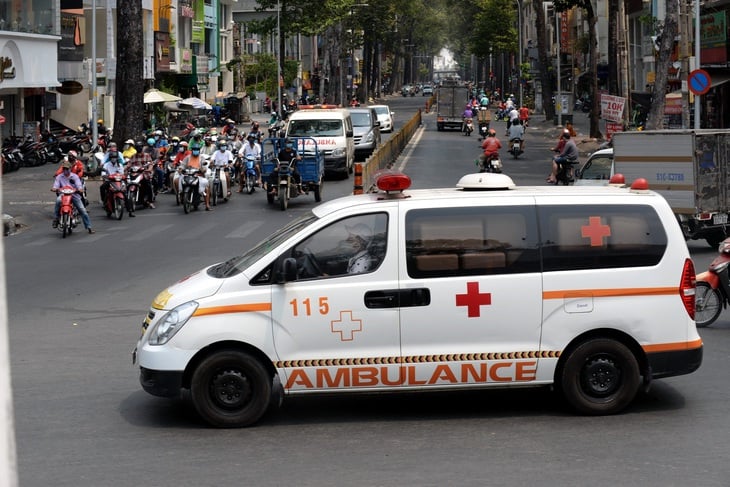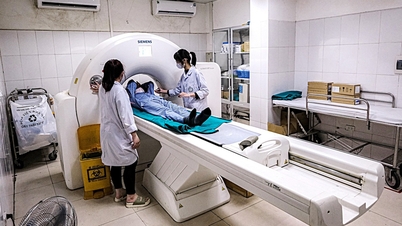
Ambulance 115 at an intersection in District 5, Ho Chi Minh City - Photo: TTD
In fact, not all cases of hiring an ambulance or a patient transport vehicle are covered by health insurance. Payment depends on the provisions of the Health Insurance Law.
When does health insurance cover the cost of patient transportation?
According to current regulations, health insurance only covers transportation costs in cases where there is a valid hospital transfer order. Specifically:
- The patient is being treated at a medical facility but his condition is beyond the treatment capacity of this facility, forcing him to be transferred to a higher level.
- Hospital transfer is indicated by a doctor and has a valid transfer form.
- In case of valid transfer, the patient can use the hospital's transport vehicle (arranged by the transfer facility), or hire an ambulance or other legal means.
- If the patient rents a car by himself/herself, the Health Insurance Fund will still pay for one-way transportation costs (outgoing trip) provided that he/she has complete records and documents as prescribed.
In which cases does health insurance not cover transportation costs?
According to current regulations, health insurance does not pay for transportation costs if the patient is not ordered to be transferred from a medical facility. The patient requests to go home by himself (even if he is in a serious condition) and is not eligible for transfer for treatment.
The patient does not have a valid transportation bill (for example, renting a car without documents, or the car does not have a license to transport patients).
In case of renting a car just to take the patient from the hospital to home, without any professional indication like the case of the ambulance charging 2.4 million VND for about 12km, the health insurance will not pay. Or in case of ambulance, ambulance arriving at the scene to take the victim, patient to a medical facility for treatment, the cost will also not be covered by the health insurance.
The cost of patient transportation
Depending on each case, health insurance pays as follows:
If the public hospital has transportation services: Payment is made according to the transportation service price approved by the competent authority.
If private hospital: Apply public hospital price to calculate payment.
If there is no transportation price list, health insurance will pay based on the actual distance between the two medical facilities. Fuel level is calculated at the rate of 0.2 liters of gasoline/km.
If there are multiple patients on the vehicle, the health insurance will only pay as if transporting one person. For patients who rent a vehicle themselves, the receiving hospital will refund the patient based on a valid invoice, then the hospital will process the payment with the social insurance agency.
To have health insurance cover the cost of transportation, you need a referral form (assigned by a doctor), a valid invoice from the transport unit (ambulance or licensed vehicle) and confirmation from the facility receiving the patient.
Thus, patients are only paid health insurance for transportation costs when they have a valid transfer order from a medical facility, travel by hospital vehicle or rent a car themselves, have a receipt and health insurance pays for the outbound transportation costs.
If the patient returns home without a referral or without a valid bill, payment will not be made.
In cases of hospital transfer for professional reasons, patients should request the hospital to issue a full transfer form and keep the transportation bill to receive payment according to regulations.
Source: https://tuoitre.vn/vu-me-hap-hoi-con-bi-xe-cap-cuu-chem-2-4-trieu-truong-hop-nao-duoc-bhyt-chi-tra-tien-xe-cap-cuu-2025101810565673.htm



































![[Photo] Parade to celebrate the 50th anniversary of Laos' National Day](/_next/image?url=https%3A%2F%2Fvphoto.vietnam.vn%2Fthumb%2F1200x675%2Fvietnam%2Fresource%2FIMAGE%2F2025%2F12%2F02%2F1764691918289_ndo_br_0-jpg.webp&w=3840&q=75)










































































Comment (0)